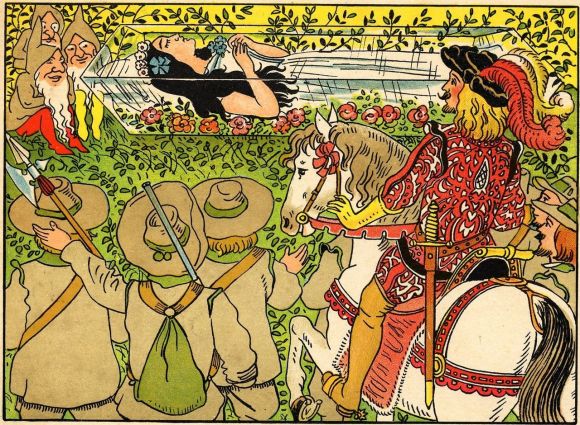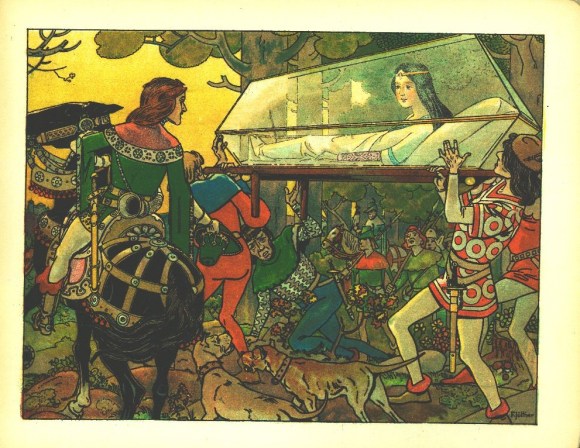
Are these stories teaching boys that it’s okay to go around kissing sleeping women?
Imagine a loved one, say a sister or daughter, is lying comatose in a hospital bed when suddenly the son of a prominent politician walks past and sees her. Infatuated with her beauty, this fortunate son walks over and plants a big kiss on her lips. Probably most of us out there would suddenly feel inclined to press either charges or a fist against this joker.
But that’s exactly what happens in the celebrated fairy tales Snow White and Sleeping Beauty, according to Professor Kazue Muta of Osaka University – a specialist in historical sociology and gender theory and the author of Sir, that love is sexual harassment! a book detailing the problems of sexual harassment in the workplace.
In a tweet posted on 11 December Prof. Muta accuses the princes in each story of sexual assault and links to a news story of a real incident in which a man in Wakayama was arrested for kissing a sleeping woman on the train.
▼ “When you think rationally about Snow White and Sleeping Beauty, that tell of a ‘princess being woken up by the kiss of a prince,’ they are describing sexual assault on an unconscious person. You might think I’m ruining the fantasy of it all, but these stories are promoting sexual violence and I would like everyone to be aware of it.”
白雪姫とか眠り姫とかの「王子様のキスでお姫様が長い眠りから目覚めた」おとぎ話、あれも、冷静に考えると、意識のない相手に性的行為をする準強制わいせつ罪です。「そんなの夢が無い」との反応あるかと思いますが、逆にこんなおとぎ話が性暴力を許している、との認識に至っていただきたいものです。 https://t.co/8Qn4Fqf2We
— 牟田和恵 (@peureka) December 11, 2017
The comment triggered a wave of response on Twitter and elsewhere on the Internet, both in support and opposition of Prof. Muta’s point of view.
“No matter how you interpret those stories, what the princes did is not sexual assault!”
“You can’t apply modern law or ethics to fairy tales.”
“In these cases it’s more like artificial respiration than sexual assault.”
“She’s right – you can’t go around kissing unconscious people; the fact that they woke up is incidental.”
“This kind of dismantling of our culture and traditions does more harm than good.”
“I’m a lawyer and since Snow White doesn’t press charges there are no grounds for sexual assault charges.”
“But if they are thought to be dead, are they still victims?”
“Meh, since they’re handsome they get a pass. That’s how it always works.”
“So if we can apply real-world laws to fiction, can the reverse also apply?”
Prof. Muta has done a good job at raising awareness with regards to sexual assault with her tweet, but are the princes in these stories really guilty of the charges laid before them? Off the cuff, I’d say definitely yes, because my foggy recollection of these stories is that these guys just happened along and took the liberty of violating these women’s personal space just because they felt like it.
However, upon reading into these tales there is a little more going on. In the Grimm version of Snow White no kiss takes place at all. Instead the Prince just moves her glass coffin which jostles her, dislodges the poison apple, and wakes her up. Granted the fact that he wanted her corpse in the first place is suspicious, but not enough to condemn him outright.
▼ “Aye she shall make the fairest compost in all the… Zounds!”
In the Grimm version of Sleeping Beauty, the prince is told beforehand that kissing her would reverse the eternal sleep and sent out on a mission to do just that. You could make the argument that even under these circumstances he has no right to kiss her without permission, but then you’d also be against mouth-to-mouth resuscitation which this is essentially a magical variation of.
In the Disney version of Sleeping Beauty too, the prince is led to kiss Princess Aurora by the fairies on the belief that he can cure her, and is not motivated by his own pervy will. Again, if you’re going to take a hard-line stance on his actions, then those fairies ought to take a major part of the accountability.
Now, the Disney version of Snow White is open for debate. In this case, the prince does just happen along and kisses the unconscious Snow White. This version also attempts to soften the act by establishing a prior relationship between them in which she and the prince fall in love at first sight.
However, after their encounter they lose contact for about a year. That’s kind of like saying you met this girl at a party and really hit it off, then a year later you find her laid out at a funeral and decide to passionately kiss her body. Sure there’s a certain romantic and tragic element to the gesture, but you can’t be surprised if her family doesn’t give you a stink eye at the very least.
Many people commented that it isn’t fair to apply our values, laws, ethics, etc. on fairy tale characters, but that’s not really the point of Prof. Muta’s message. In a relatively lighthearted way, it brought the issue further into the light in Japan and has people now discussing the very nature of sexual assault so that we may reach a better understanding and consensus about it – because if 2017 has taught us one thing, it’s that a lot of us don’t get it.
Sources: Twitter/@peureka, J-Cast News, Hachima Kiko
Top image: Wikipedia/Lothar Meggendorfer
Insert image: Wikipedia/Franz Jüttner


 Are Snow White, Sleeping Beauty, and The Little Mermaid all dating the same prince?
Are Snow White, Sleeping Beauty, and The Little Mermaid all dating the same prince? “Poison Apple” from sacred mountain in Japan is said to grant your wishes this Valentine’s Day
“Poison Apple” from sacred mountain in Japan is said to grant your wishes this Valentine’s Day Japan Extreme Budget Travel! A trip from Tokyo to Izumo for just 30,000 yen [Part 1]
Japan Extreme Budget Travel! A trip from Tokyo to Izumo for just 30,000 yen [Part 1] Japanese drugstore sells onigiri at pre-stupid era prices, but how do they compare to 7-Eleven?
Japanese drugstore sells onigiri at pre-stupid era prices, but how do they compare to 7-Eleven? Japan’s new “Cunte” contact lenses aren’t pronounced like you’re probably thinking they are
Japan’s new “Cunte” contact lenses aren’t pronounced like you’re probably thinking they are Skyscraper sized Pokémon cards to appear in Tokyo all year long in Tocho projection mapping event
Skyscraper sized Pokémon cards to appear in Tokyo all year long in Tocho projection mapping event Beautiful website catalogues some of Japan’s most ornate manhole covers
Beautiful website catalogues some of Japan’s most ornate manhole covers Fashion for the young at heart! A different take on what it means to get older in Japan
Fashion for the young at heart! A different take on what it means to get older in Japan 7-Eleven Japan’s sakura sweets season is underway right now!
7-Eleven Japan’s sakura sweets season is underway right now! Starbucks Japan releases first-ever Hinamatsuri Girls’ Day Frappuccino
Starbucks Japan releases first-ever Hinamatsuri Girls’ Day Frappuccino Satisfy your sweet tooth with cheesecake and more all-you-can-eat sweets at Cheese Garden
Satisfy your sweet tooth with cheesecake and more all-you-can-eat sweets at Cheese Garden 10 beautiful packaging designs from Japan
10 beautiful packaging designs from Japan The 10 most annoying things foreign tourists do on Japanese trains, according to locals
The 10 most annoying things foreign tourists do on Japanese trains, according to locals Starbucks Japan releases new sakura goods and drinkware for cherry blossom season 2026
Starbucks Japan releases new sakura goods and drinkware for cherry blossom season 2026 Is Sapporio’s Snow Festival awesome enough to be worth visiting even if you hate the snow? [Pics]
Is Sapporio’s Snow Festival awesome enough to be worth visiting even if you hate the snow? [Pics] Japan has trams that say “sorry” while they ride around town…but why?
Japan has trams that say “sorry” while they ride around town…but why? Tokyo Skytree turns pink for the cherry blossom season
Tokyo Skytree turns pink for the cherry blossom season Highest Starbucks in Japan set to open this spring in the Tokyo sky
Highest Starbucks in Japan set to open this spring in the Tokyo sky Shibuya Station’s Hachiko Gate and Yamanote Line stairway locations change next month
Shibuya Station’s Hachiko Gate and Yamanote Line stairway locations change next month Yakuzen ramen restaurant in Tokyo is very different to a yakuza ramen restaurant
Yakuzen ramen restaurant in Tokyo is very different to a yakuza ramen restaurant Starbucks Japan adds new sakura Frappuccino and cherry blossom drinks to the menu
Starbucks Japan adds new sakura Frappuccino and cherry blossom drinks to the menu Japan’s newest Shinkansen has no seats…or passengers [Video]
Japan’s newest Shinkansen has no seats…or passengers [Video] Foreigners accounting for over 80 percent of off-course skiers needing rescue in Japan’s Hokkaido
Foreigners accounting for over 80 percent of off-course skiers needing rescue in Japan’s Hokkaido Super-salty pizza sends six kids to the hospital in Japan, linguistics blamed
Super-salty pizza sends six kids to the hospital in Japan, linguistics blamed Starbucks Japan unveils new sakura Frappuccino for cherry blossom season 2026
Starbucks Japan unveils new sakura Frappuccino for cherry blossom season 2026 Foreign tourists in Japan will get free Shinkansen tickets to promote regional tourism
Foreign tourists in Japan will get free Shinkansen tickets to promote regional tourism Take a trip to Japan’s Dododo Land, the most irritating place on Earth
Take a trip to Japan’s Dododo Land, the most irritating place on Earth Naruto and Converse team up for new line of shinobi sneakers[Photos]
Naruto and Converse team up for new line of shinobi sneakers[Photos] Is China’s don’t-go-to-Japan warning affecting the lines at a popular Tokyo gyukatsu restaurant?
Is China’s don’t-go-to-Japan warning affecting the lines at a popular Tokyo gyukatsu restaurant? Survey asks foreign tourists what bothered them in Japan, more than half gave same answer
Survey asks foreign tourists what bothered them in Japan, more than half gave same answer Japan’s human washing machines will go on sale to general public, demos to be held in Tokyo
Japan’s human washing machines will go on sale to general public, demos to be held in Tokyo Starbucks Japan releases new drinkware and goods for Valentine’s Day
Starbucks Japan releases new drinkware and goods for Valentine’s Day We deeply regret going into this tunnel on our walk in the mountains of Japan
We deeply regret going into this tunnel on our walk in the mountains of Japan Studio Ghibli releases Kodama forest spirits from Princess Mononoke to light up your home
Studio Ghibli releases Kodama forest spirits from Princess Mononoke to light up your home Major Japanese hotel chain says reservations via overseas booking sites may not be valid
Major Japanese hotel chain says reservations via overseas booking sites may not be valid Put sesame oil in your coffee? Japanese maker says it’s the best way to start your day【Taste test】
Put sesame oil in your coffee? Japanese maker says it’s the best way to start your day【Taste test】 No more using real katana for tourism activities, Japan’s National Police Agency says
No more using real katana for tourism activities, Japan’s National Police Agency says